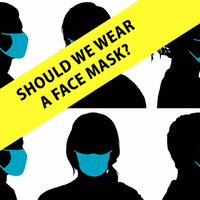
200702|我们应该戴口罩吗?(angela1ee)
口罩最早在何时何地被广泛使用? 公众号MissRui同步更新 Introduction With the outbreak of the coronavirus epidemic, people in many countries around the world have started wearing face masks to protect both themselves and others they come into contact with. In this programme Rob and Sam discuss whether wearing masks in public can help prevent the spread of coronavirus in the community. 随着冠状病毒疫情的爆发,世界上许多国家的人们开始戴口罩,以保护自己和接触到的其他人。在这个节目中,罗伯和萨姆讨论在公共场合戴口罩是否有助于防止冠状病毒在社区中的传播。 This week's question When and where were face masks first widely used? Was it: a) 1855 in Vienna, b) 1905 in Chicago, or c) 1955 in London. Listen to the programme to find out the answer. Vocabulary 1.equivocal模棱两可的 difficult to interpret because it seems to have two opposite or contradictory meanings 2.it stands to reason (that)合乎情理的 is obviously true from the facts 3.heated debate激烈的辩论 discussion or argument in which people become angry and excited 4.emitting散发 sending out into the air, for example a noise or smell or a virus 5.mask shaming未戴口罩的嘲笑(属于疫情中的新词吧) criticising, mocking or humiliating someone for not wearing a face covering 6.false sense of security错以为安全 belief that you are safe when you are not Transcript Note: This is not a word-for-word transcript Rob Hello. This is 6 Minute English from BBC Learning English. I’m Rob. Sam And I’m Sam. Rob With the outbreak of the coronavirus epidemic, people in many countries around the world have started wearing face masks to protect both themselves and others they come into contact with. In this programme we’ll be asking whether wearing masks in public can help prevent the spread of coronavirus in the community. Sam Face masks have long been popular in some Asian countries but with the spread of Covid- 19, they’re increasingly being seen in other parts of the world too. Rob Wearing a protective mask or face covering is nothing new. Medical masks have a long history from the plagues of medieval Europe to nineteenth century outbreaks of cholera in the United States, but when did they start to be commonly used? That’s my quiz question for today: when and where were face masks first widely used? Was it: a) 1855 in Vienna, b) 1905 in Chicago, or c) 1955 in London. Sam Well, you mentioned cholera outbreaks in the US, so I’ll say b) 1905 in Chicago. Rob Right Sam, we’ll find out later if you were right. Now, face masks may inspire confidence but what is the evidence that they actually protect the wearer from contracting the virus or prevent infected people from spreading the virus to others? Sam Professor Robert West has conducted a review of over twenty studies looking into the evidence. Here he is speaking to the BBC World Service programme Health Check… Professor Robert West The evidence is equivocal on it. It doesn’t tell you anything yet - hopefully that will change. So we’re thrown back on first principles and this is why, as in so many areas of public health, you get such a heated debate because people are really relying on their opinion on things and you will have one group who say, 'Well, it stands to reason',- the good old ‘stands to reason’ argument – which is: obviously, if you’ve got a covering in front of your face, and you’re speaking or coughing into that covering, it’s going to trap quite a lot of the virus on the droplets you’ll be emitting. Rob So far the evidence over whether face masks are helpful or harmful is equivocal – difficult to interpret because it seems to have two opposite or contradictory meanings. Based on current evidence, Professor West feels we cannot say whether mask-wearing is beneficial. Sam Some evidence suggests that wearing masks can prevent the disease spreading and some suggests the opposite. Rob There may be reasons why wearing masks could actually increase the spread of coronavirus. Sam However for some people, it stands to reason that masks are beneficial– meaning it is obviously true from the facts. Rob Actually, the evidence is far from obvious. But everyone has an opinion on the issue and after weeks of stressful lockdown, this can lead to heated debate – discussion or argument in which people become angry and excited. Sam Up until recently, the World Health Organisation said there were two groups who definitely should wear masks: people showing symptoms of the virus and their carers. Rob But that left the problem of people who have the virus without knowing it and maybe unintentionally emitting it – sending something out into the air, for example a noise or smell, or in this case, coronavirus. In June the WHO advice changed – now they say masks should be worn in public where social distancing measures are not possible. Sam But the advantages of wearing masks might be outweighed by other considerations, as Professor West explains… Professor Robert West It could also have unfortunate negative consequencesin terms of mask shaming – that people feel compelled to wear masks in situations where it’s actually not helpful and may be harmful because it’s expected of them and they feel that they would be judged if they didn’t. But I think in addition to that, one of the problems we have is that masks can potentially create a false sense of security. Rob One negative effect is the practice of mask shaming – criticising or humiliating someone for not wearing a face covering. Sam Another problem is that wearing masks might create a false sense of security – a feeling of being safer than you really are. Is that what happened in 1905 Rob? Rob Ah yes, today’s quiz question. I asked you when face masks were first widely used? Sam And I said, b) 1905 in Chicago. Rob Well done Sam, you were absolutely right! It was 1905 in Chicago when Dr Alice Hamilton first noticed that carers wearing masks to treat scarlet fever patients, did not get sick. Sam Interesting. Today we we’ve been discussing whether wearing masks helps prevent infected people emitting – or sending out, coronavirus. Rob So far the evidence is equivocal – unclear because it seems contradictory. In other words, we can’t say either way for certain. Sam But for some, it stands to reason - meaning it’s obviously true - that mask-wearing is a good idea. Rob This disagreement over wearing face coverings has started heated debate – that’s discussion which becomes angry or excited. Sam And this in turn has led to incidents of mask shaming – criticising or mocking people for not wearing a face mask. Rob A final drawback is that masks might give the wearer a false sense of security – that’s belief that they are safe when they are not. Sam That’s all we’ve got time for today. Rob Bye for now! Sam Bye! Link: https://www.bbc.co.uk/learningenglish/english/features/6-minute-english/ep-200702











